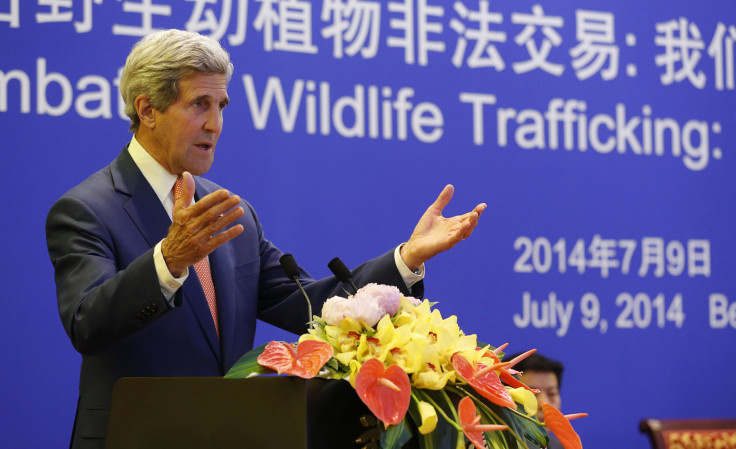Climate Change Policy: US, China Take Cautious Steps In Beijing Toward Bilateral Cooperation

The United States and China on Tuesday took cautious steps toward bilateral cooperation on climate change policy. The two countries signed eight partnership pacts in Beijing to promote the exchange of research and technology for greenhouse gas-cutting initiatives.
Consensus between the world’s two biggest carbon emitters is critical to forming a new global climate pact to replace the 1997 Kyoto Protocol, Reuters reported. But the nations have long sparred over how to address climate change. Both sides remain reluctant to commit to sweeping reductions in emissions unless the other party takes the plunge, too, and leaders have long struggled to agree on how the costs of reducing carbon should be split among rich and poor nations.
“The significance of these two nations coming together [this week] can’t be understated,” U.S. Secretary of State John Kerry said on Wednesday, speaking at the latest round of the U.S.-China Strategic and Economic Dialogue in China’s capital. “We are working hard to find a solution together that can have an impact on the rest of the world.”
The partnership deals were signed ahead of a two-day visit to China by top Obama administration officials, including Kerry, Treasury Secretary Jack Lew and Energy Secretary Ernest Moniz, as well as Todd Stern, the lead U.S. climate treaty negotiator at the State Department, Reuters noted.
In one of the agreements, China’s Huaneng Clean Energy Research Institute, a subsidiary of the state-owned utility China Huaneng Group (HNGZ:CH), agreed to share information with Washington-based Summit Power Group about a pilot project it's developing in Tainjin to turn coal into a synthetic gas. The technology, called integrated gasification combined cycle, gasifies coal and strips it of carbon dioxide and air pollutants like sulfur dioxide. The gas is then combusted to fire up power plants, while the harmful gases are compressed and stored.
Summit Power, in turn, will share information and technology about its own project in Texas for using captured carbon to force oil out of hard-to-tap wells.
Another agreement joins the University of Kentucky, a coal state institution, with Shanxi Coal International Energy Group Co. (600546:CH) and Pennsylvania-based Air Products and Chemicals Inc. (NYSE: APD). The group will work on a project feasibility study for a 350-megawatt coal-fired power plant that can capture 2 million metric tons of carbon dioxide per year, Reuters reported.
Climate policy experts said the U.S.-China carbon initiatives could help lay the groundwork for more advanced conversations around climate policy at the United Nations-led climate conference in Paris this December. Leaders at the annual summit will aim to reach an agreement for reducing carbon emissions worldwide.
“The success of Paris hinges heavily on how ambitious the numbers are,” Elliot Diringer, executive vice president of the Center for Climate and Energy Solutions, a climate policy nonprofit in Virginia, told the Christian Science Monitor. China and the United States have agreed to announce their commitments for reducing carbon emissions ahead of the Paris summit to ensure scrutiny, Diringer added.
A top Chinese economic planner on Wednesday welcomed closer climate ties between China and the United States but cautioned that more work still needs to be done to partner in areas like technological cooperation, Reuters noted.
"Developing countries are most concerned that they get funds and technological support from developed countries," Xie Zhenhua, vice chairman of China's influential National Development and Reform Commission, told reporters. "On this issue, we are still having great difficulties, and we have to put forth more effort."
© Copyright IBTimes 2024. All rights reserved.



















